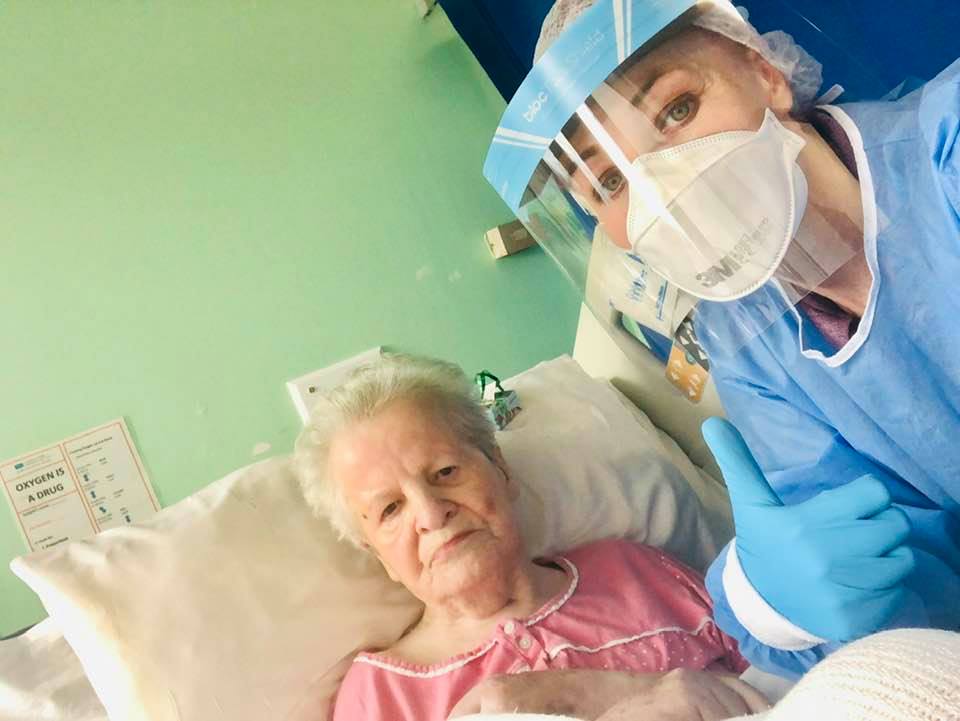
A daughter who lobbied to be able to visit her mother in a care home during the Covid-19 lockdown last year is again taking to the campaign trail.
Martina Ferguson (nee Derry), from Portadown, lead campaigner for Care Partners, will be at Stormont this Saturday, November 20, along with other families to raise awareness and highlight a number of issues.
Although Martina’s much-loved mum Ursula passed away in January, aged 88, she is continuing to support people with family members in care homes and care settings.
“I suppose helping other families and raising awareness is a way of dealing with my grief. “My mum relied on tactile sensory, the sensation of touch and a hug, and I understand the importance of spending meaningful quality time with a loved one in a care home,” she said.
She and the other families believe a return to normal visiting has been rolled out too slowly compared to the easing of restrictions within wider society and that care home residents are being discriminated against.
Martina also wants more families to be aware of the rules around care partners which allow close family members to visit during outbreaks.
“We aren’t talking about a free-for-all. We understand residents are vulnerable. However, care partners are a risk-assessed and risk-managed approach for the vulnerable and all immediate family members should be allowed to be care partners (not just up to two) because that is unfair and disproportionate – there are many families that have more than two people in them,” she said.
She said that while some families are happy with their visiting arrangements “there are still many who are restricted, separated for long periods and afraid to speak out”.

Happier times. Martina with her mum Ursula
She has also pointed to the “scandalous” situation whereby testing of staff in care homes is not mandatory, while care partners can only see their loved ones during outbreaks if they test negative.
She explained: “I have just discovered this recently as I thought like many other families thought, that staff testing was mandatory since early in the pandemic but it’s not. Whilst the number of staff getting tested might be high this doesn’t mean they are all tested or tested regularly.”
She said the issues affect not just the elderly in care homes, but also those of all ages with a learning disability in care settings.
Martina spoke last year of how she was at her wits’ end at not being able to see her mother, who had advanced dementia, except through a window.
Although that campaign was successful and led to a change in the guidance around visits by care partners, it was too late for Martina and she never managed to get into her mother’s care home during the first nine months of lockdown.
Her mum contracted Covid in the care home during Christmas week and passed away within two weeks.
“Thankfully I got into the hospital Covid ward as a care partner and held my mother’s hand to the end,” she said. “I wish other families were made aware of the care partner guidance. I feel this is not regulated properly on the ground and for families’.”

Martina with mum Ursula in hospital at Christmas
The group will be at Stormont this Saturday from 11-12 and will hold a minute’s silence at noon for those who have lost loved ones and for their absent friends.
The Department of Health was contacted for comment and provided this detailed response below:
“Protecting residents and staff in our care homes continues to be a key priority for the Department throughout all phases of the COVID-19 pandemic. In recognition that care homes are distinct from other care settings, in that they are closed environments and have a specific and particular risk profile, the Department has implemented comprehensive Polymerase Chain Reaction (PCR) COVID-19 asymptomatic testing arrangements for care home residents and staff. Any care home staff who test positive for COVID-19 are not permitted to return to work and have to immediately self-isolate for 10 days and follow the public health guidance. Through the regular programme of asymptomatic testing (that is testing of those who are not displaying symptoms of COVID-19 infection), the Department also supports the Care Partners’ Scheme by making the same weekly care home staff PCR testing also available to nominated care partners.
“Evidence shows that care homes are particularly at risk of COVID-19 and it is important to note that not all individuals who may carry the SARS-CoV-2 virus (which causes COVID-19) will have or display symptoms – about 1 in 3 people with COVID-19 do not have symptoms, but can still infect others. The ongoing programme of regular testing in care homes across Northern Ireland is therefore central to identifying asymptomatic cases, in managing the spread of infection, helping to prevent and control outbreaks, and allowing the appropriate steps to be taken at the right time to protect some of our most vulnerable citizens in our society.
“However, there may be circumstances when it is not appropriate for an individual, such as a member of staff or a care partner, to participate in the weekly COVID-19 PCR testing arrangements. For example, if an individual has previously received a positive PCR test within 90 days, further testing is not recommended unless that person has developed new symptoms potentially consistent with COVID-19 infection. This is because a repeat test may result in a positive result due to the presence of residual (dead) virus within the individual’s system, which does not represent active infection with the virus.
“Although COVID-19 testing is not currently mandatory, the Department continues to strongly encourage all care home staff and care partners to continue to participate in the weekly PCR testing arrangements, not only to protect themselves, but also importantly their loved ones and other care home residents who are often considered to be at greater risk to COVID-19 due to their individual clinical vulnerabilities.
“Separately, rapid Lateral Flow Device (LFD) testing for care home visitors who do not have any COVID-19 symptoms (that is they are asymptomatic) is currently available as an additional support to the existing range of public health measures which are already in place across care homes. Rapid LFD tests for COVID-19 have an important role in detecting cases in people who are infected but are showing no symptoms and may be unwittingly passing the virus on to others. LFD tests are effective at picking up those who are most infectious. These LFD test kits can be obtained directly from the care homes. The Department recommends that all asymptomatic visitors to undertake LFD self-testing (twice a week, every 3 to 4 days) prior to visiting care homes which do not have a COVID-19 outbreak. It is however important to remember that while a LFD test for COVID-19 may help reduce the risk associated with care home visiting, acting as an additional mitigating measure, it does not completely remove the risk of infection and even with a negative test result, staff, care partners and visitors need to continue to adhere to the full suite of public health measures in place – including the use of Personal Protective Equipment (PPE), good hand hygiene, and other robust infection prevention and control (IPC) measures.
“In addition, families and friends intending to bring their loved ones out on trips from care homes may also wish to avail of LFD testing, if they are not already participating in other testing arrangements. LFD tests for the general public are currently free and can be ordered online for free delivery to a person’s home https://www.gov.uk/order-coronavirus-rapid-lateral-flow-tests LFD tests can also be collected in a number of locations across Northern Ireland: Find where to get rapid lateral flow tests – NHS (test-and-trace.nhs.uk) or alternatively phone 119 (free from mobiles and landlines) from 7am to 11pm to order LFD tests.”



